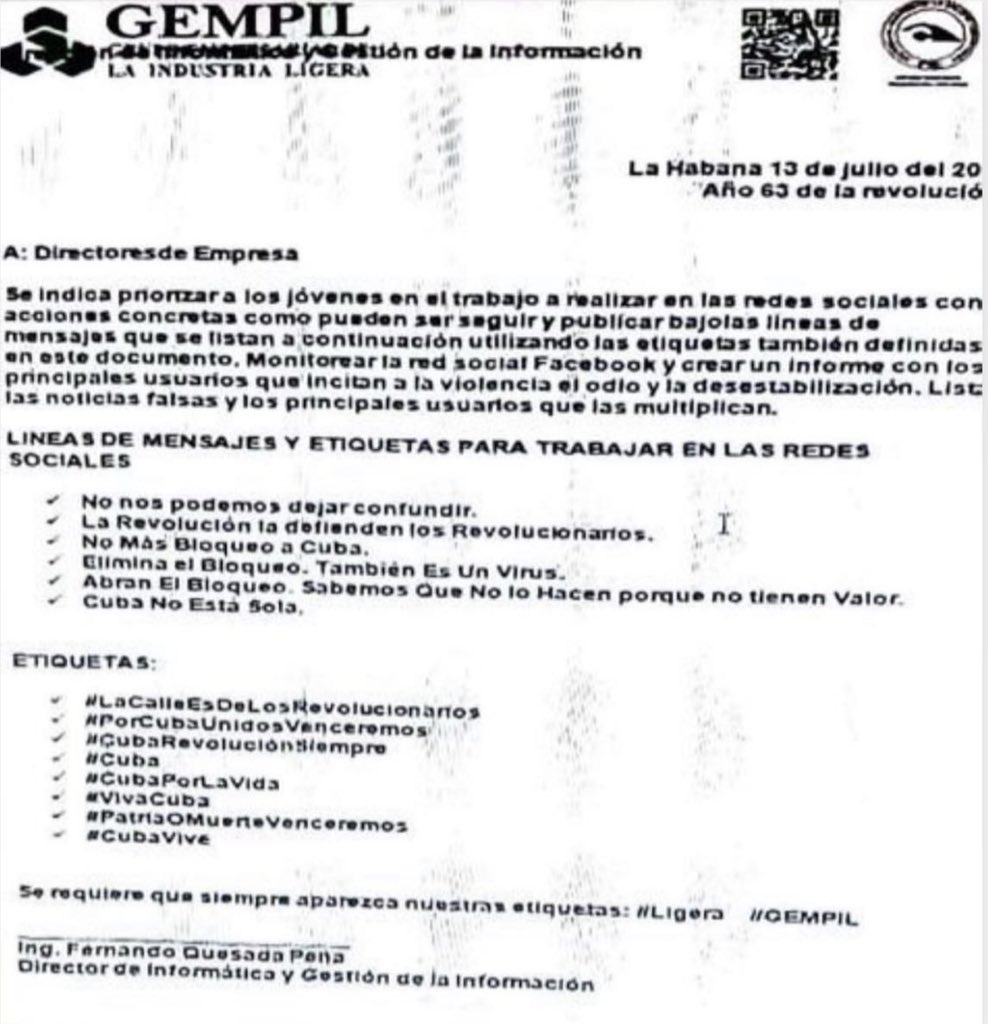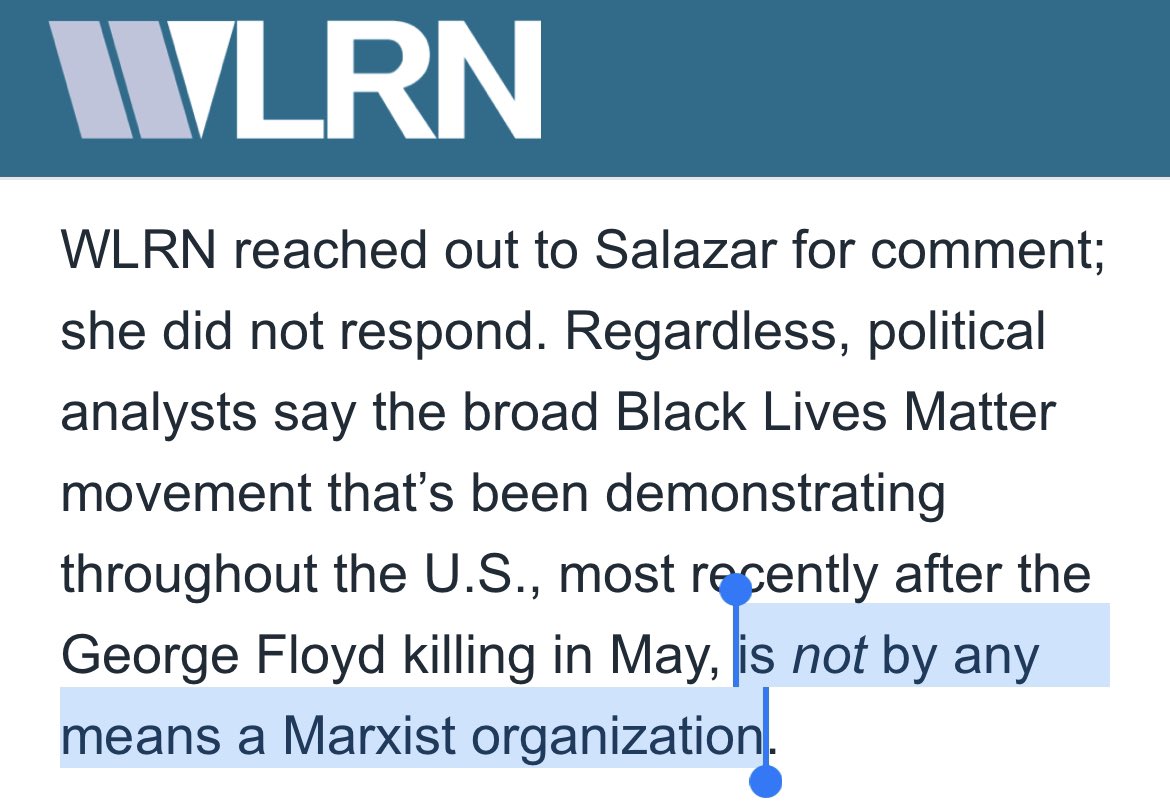
THREAD: "Revolución" was trending, so I thought I should help my fellow Americans understand how the Cuban regime requires and pressures its people, particularly students, to attend these fake pro-dictatorship rallies.
And yes, it's absolutely insane. #SOSCuba #PatriaYVida
And yes, it's absolutely insane. #SOSCuba #PatriaYVida

Despite the propaganda, the first thing Americans need to understand is that the demonstrations are organized by the regime.
They are not organic.
They are not "student led."
The government stages them to project legitimacy internationally and to control the population.
They are not organic.
They are not "student led."
The government stages them to project legitimacy internationally and to control the population.
University students are *required* to attend the rallies.
At minimum, students who refuse can get expelled or see their class rankings drop.
This article details how some are refusing to participate in today's rally and the consequences they may face. noticuba.tech/cuba/Estudiant…
At minimum, students who refuse can get expelled or see their class rankings drop.
This article details how some are refusing to participate in today's rally and the consequences they may face. noticuba.tech/cuba/Estudiant…
How does skipping a rally impact students? Glad you asked.
The Cuban university student ranking system is called "el escalafón." Your class ranking is determined by:
1) Your academic GPA.
2) A "moral character" score measuring how "revolutionary" the faculty considers you.
The Cuban university student ranking system is called "el escalafón." Your class ranking is determined by:
1) Your academic GPA.
2) A "moral character" score measuring how "revolutionary" the faculty considers you.
The "moral character" score weighs more heavily than academics and is determined by factors like:
☑️Number of pro-regime rallies you attend
☑️Ratting out classmates who oppose the government
Yes, your class ranking has a big impact on your quality of life in Cuba.
☑️Number of pro-regime rallies you attend
☑️Ratting out classmates who oppose the government
Yes, your class ranking has a big impact on your quality of life in Cuba.
Cuba is a state-run economy. The government is, by far, the island's top source of jobs — from hospitality to health care.
The best jobs are reserved for the top of the "escalafón."
Everyone else gets trash. #SOSCuba
The best jobs are reserved for the top of the "escalafón."
Everyone else gets trash. #SOSCuba
In Cuba, graduates don't just apply to jobs. The government assigns you one and those who rank highest in the "escalafón" (most revolutionary) get more choices. Many pick career tracks with opportunities to defect.
Everyone else gets trash. #SOSCuba
Everyone else gets trash. #SOSCuba
If you refuse to attend rallies that are of special importance to the regime (like today's), you will be placed under a "periodo de evaluación" (evaluation period).
This sucks because it means the faculty will monitor you more closely for anti-government activity. #SOSCuba
This sucks because it means the faculty will monitor you more closely for anti-government activity. #SOSCuba
This "evaluation period" can include faculty interrogations, getting on the s*** list of state security agents and being summed the UJC (Union of Young Communists).
#SOSCuba #PatriaYVida
#SOSCuba #PatriaYVida
Another gem:
Each member of every graduating class *must* complete a form to be considered to work at MININT (Ministry of Interior, AKA the domestic spy agency and military).
If MININT selects you, you *must* work for them for 2 years. It's not optional. #SOSCuba #PatriaYVida
Each member of every graduating class *must* complete a form to be considered to work at MININT (Ministry of Interior, AKA the domestic spy agency and military).
If MININT selects you, you *must* work for them for 2 years. It's not optional. #SOSCuba #PatriaYVida
So, not only are students required to attend pro-government rallies, attendance actually increases your chances of getting picked to work for the government's state security apparatus.
And, of course, the MININT jobs come with benefits, like better salaries, food, and AC.
And, of course, the MININT jobs come with benefits, like better salaries, food, and AC.
The consequences for workers who don't attend rallies are worse.
Cuban workplaces have communist committees that meet regularly to evaluate their coworkers' commitment to the revolution. Non-attendance is documented.
Employees who do not attend rallies are humiliated.
Cuban workplaces have communist committees that meet regularly to evaluate their coworkers' commitment to the revolution. Non-attendance is documented.
Employees who do not attend rallies are humiliated.
Yes, skipping rallies also hurts your career ascension.
To reach a workplace manager or director, you *must* be a member of the Communist Party and these workplace committees.
And, of course, Communist Party members are required to attend these absurd pro-government rallies.
To reach a workplace manager or director, you *must* be a member of the Communist Party and these workplace committees.
And, of course, Communist Party members are required to attend these absurd pro-government rallies.
Finally, it's not just limited to rallies.
In Cuba, managers give their employees pro-government talking points to use on social media. Below is a memo from this week.
And yes, your manager can check your social media accounts to ensure compliance. #SOSCuba
In Cuba, managers give their employees pro-government talking points to use on social media. Below is a memo from this week.
And yes, your manager can check your social media accounts to ensure compliance. #SOSCuba

I hope this thread helps more people understand the systemic and institutionalized oppression in Cuba.
Next time you hear of a pro-government rally in Cuba, remember the attendees' livelihoods depend on being there.
#SOSCuba #PatriaYVida
Next time you hear of a pro-government rally in Cuba, remember the attendees' livelihoods depend on being there.
#SOSCuba #PatriaYVida
• • •
Missing some Tweet in this thread? You can try to
force a refresh








